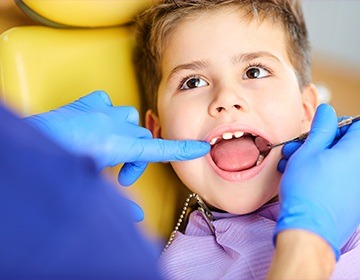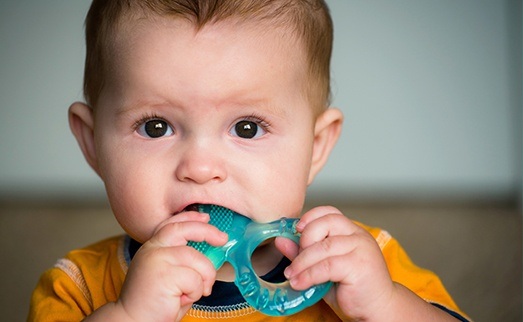
Children’s Dentistry – Carlisle, PA
Start Your Child’s Oral Care Regimen Early!

Our general family dental care services include children's dentistry. We would love to start seeing your child around the age of three. By starting early, we get a good head start on your child's oral health. We can help your child get comfortable with trips to the dental office and help prevent future dental anxiety. Your son or daughter's first children's dentistry visit will consist of an examination of their teeth and gums, possible X-rays, and a very gentle cleaning. We might apply a fluoride treatment to protect your child's teeth from cavities. As your little one ages, we'll spend these visits checking on the development of his or her bite. Once the adult teeth come in, we can apply dental sealants to your child's molars. Dental sealants play a major role in children's dentistry, protecting cavity-prone kids during these very important years. If we can keep your child's smile healthy into adulthood, they stand a better chance of lifelong oral health.
Why Choose Carlisle Family & Cosmetic Dentistry for Children’s Dentistry?
- Silver Diamine Fluoride Available
- Caters to Children with Special Needs
- Frenectomies and Pulp Therapy Performed
Dental Sealants

As your child gets used to practicing oral care every day, they may find themselves struggling to keep all of their teeth protected. This is particularly true when it comes to their molars, which have many deep cracks that allow food debris and plaque to settle in. Over time, these teeth can become a breeding ground for plaque development and eventually cavities. Dental sealants use composite resin to seal these teeth, making them easier to maintain as your child hones in on their dental hygiene skills. Application only takes a few minutes to complete and they can expect protection for many years afterward.
Children’s Special Needs Dentistry

All children deserve high-quality dental care, no matter what their needs are. Dr. Neslund, Dr. Benner, and the rest of our team members at Carlisle Family & Cosmetic Dentistry want to make your child’s visit as comfortable and accommodating as possible, including those with special needs. Our dental office will be patient, prepared, and ready to provide care with their needs in mind. If you have a specific request that you’d like to make for your child, feel free to call our dental office ahead of time so we can more effectively meet their needs.
Silver Diamine Fluoride Treatment

In the event that your child develops a cavity, it’s entirely possible that a dental filling is too much for them to handle. That’s where silver diamine fluoride can make a huge difference. This unique fluoride treatment is specifically meant to help young patients control their cavities without the use of drills or dental fillings, which would be the traditional method of treatment. With less than a drop applied to your child’s tooth, we can effectively manage the development of the cavity and reduce sensitivity, which is common for damaged tooth enamel.
Frenectomies/Lip & Tongue-Tie

Have you ever paid close attention to the tiny bit of tissue that attaches your child’s tongue to their bottom palate? Have they ever struggled to breastfeed or even speak and chew properly because of this tissue? Dr. Neslund and Dr. Benner perform frenectomies to reduce this tissue, whether it’s attached to their tongue or top and bottom lips. The procedure is quick, gentle and incredibly effective at reducing problems associated with speech, eating and breastfeeding.
Non-Nutritive Habits

Thumb-sucking and tongue-thrusting may seem like harmless habits at first, but the long-term implications they hold for your child can be detrimental if not managed early. For example, thumb-sucking can easily allow an open bite to develop, making it more difficult to chew foods without damaging their tooth enamel. Dr. Neslund and Dr. Benner will go over methods to help break these non-nutritive habits before they cause developmental problems down the road.
Pulp Therapy

If your child has sustained a significant injury to their teeth, it can easily expose the vulnerable pulp that lies inside the dental structure. In this case, pulp therapy is necessary to treat, restore, and save the damaged tooth. This procedure can be performed on both primary (baby) or permanent teeth, so there’s no reason you should put off treatment just because your child's primary teeth are going to fall out anyway. If your son or daughter reports unexplained oral pain, sensitivity to warm or cold foods, and swelling/redness around the tooth, bring them into our dental office as soon as possible.